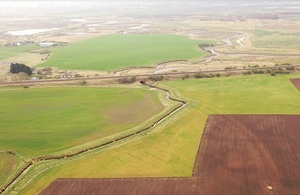Major work starts at Greatham Beck in Teesside
Construction has started on a £4m major restoration project that will return Greatham Beck to its traditional course after centuries of industrial changes.

The image shows an aerial view of Greatham Beck and the area the restoration will take place.
The Environment Agency’s Greatham Marsh Restoration Scheme, which officially started on site this month (October 2025), will restore the historic alignment of the beck by opening its channels to tidal influence and re-establishing parts of the natural marshland – all without increasing flood risk.
The project, delivered with The Greatham Foundation and Northumbrian Water, is the latest milestone in the £30 million Tees Tidelands Programme, a ground-breaking initiative helping the River Tees estuary adapt to climate change while restoring valuable habitat for internationally important wildlife.
Northumbrian Water has contributed £2million towards the Greatham Marsh project.
Matthew Rountree, Environment Agency Project Manager, said:
The River Tees Estuary sits at the heart of one of the North East’s industrial centres. While this industry is vital for jobs and the economy, human activity within the estuary has led to the loss of 90% of the intertidal habitat that once existed, and barriers on all tributaries.
This disconnection between industry and nature has caused a drastic decline in biodiversity and increased vulnerability to climate change impacts. By allowing Greatham Beck to return to its natural form, we can restore balance to the estuary and allow the tide to return to areas lost to development.”
The work has started during the Environment Agency’s Flood Action Week, running from 13-19 October. Communities are already seeing the impacts of climate change through wetter winters and drier summers, with data from the EA showing that around 6.3 million homes and businesses in England are in areas at risk of flooding from rivers, the sea or surface water
Millions across the country are being urged to get flood ready – such as by signing up for flood warnings or preparing a flood plan.

Ground breaks on the Greatham scheme with (left to right): Kathryn Waugh, Northumbrian Water Wastewater Head of Strategy and Planning; Graeme Hull, Environment Agency; Margaret Bousfield, Chair of Trustees at the Greatham Foundation; and Joe Rodgers, from BAM Nuttall.
Pioneering Tees Tidelands
The pioneering set of projects as part of Tees Tidelands will help the River Tees Estuary adapt to climate change by creating over 50 hectares of mudflats, saltmarsh and other valuable estuarine habitats, as well as reducing flood risk for homes and businesses, now and into the future.
As part of the Greatham Marsh restoration, a redundant tidal structure will be removed, allowing the channel to flow as it would have done historically. This will enable migratory fish to return to the beck where they haven’t been seen for decades.
The scheme will create or enhance 21.3 hectares of saltmarsh and mudflat, providing crucial habitat for internationally important species including curlews and avocets. The restoration will also improve water quality and strengthen the area’s resilience to climate change.
Saltmarsh acts as a natural sink for carbon and nutrients. The project is expected to increase carbon sequestration in the area by 129 tonnes per year, supporting the Environment Agency’s net zero objectives.
Saltmarsh plants and mud will hold nutrients that would otherwise enter Seal Sands and risk negatively impacting this internationally important feeding area for birds. The project will also plant 1.5 kilometres of species-rich native hedgerow and ecologically valuable treeline.
The Greatham Marsh Restoration scheme demonstrates how nature-based solutions can safeguard Teesside’s economic prosperity while enhancing the environment. The Environment Agency is working with partners including The Greatham Foundation, BAM Nuttall, JBA Consulting, Turner & Townsend, and Northumbrian Water.
Once completed, the Tees Tidelands Programme will deliver long-term flood risk management and climate change adaptation, alongside significant improvements to nature and water quality. The ambitious programme features schemes across Teesside at sites near Greatham, Port Clarence, Portrack, along the banks of the River Tees and in rivers such as Lustrum Beck, Ormesby Beck and Billingham Beck.